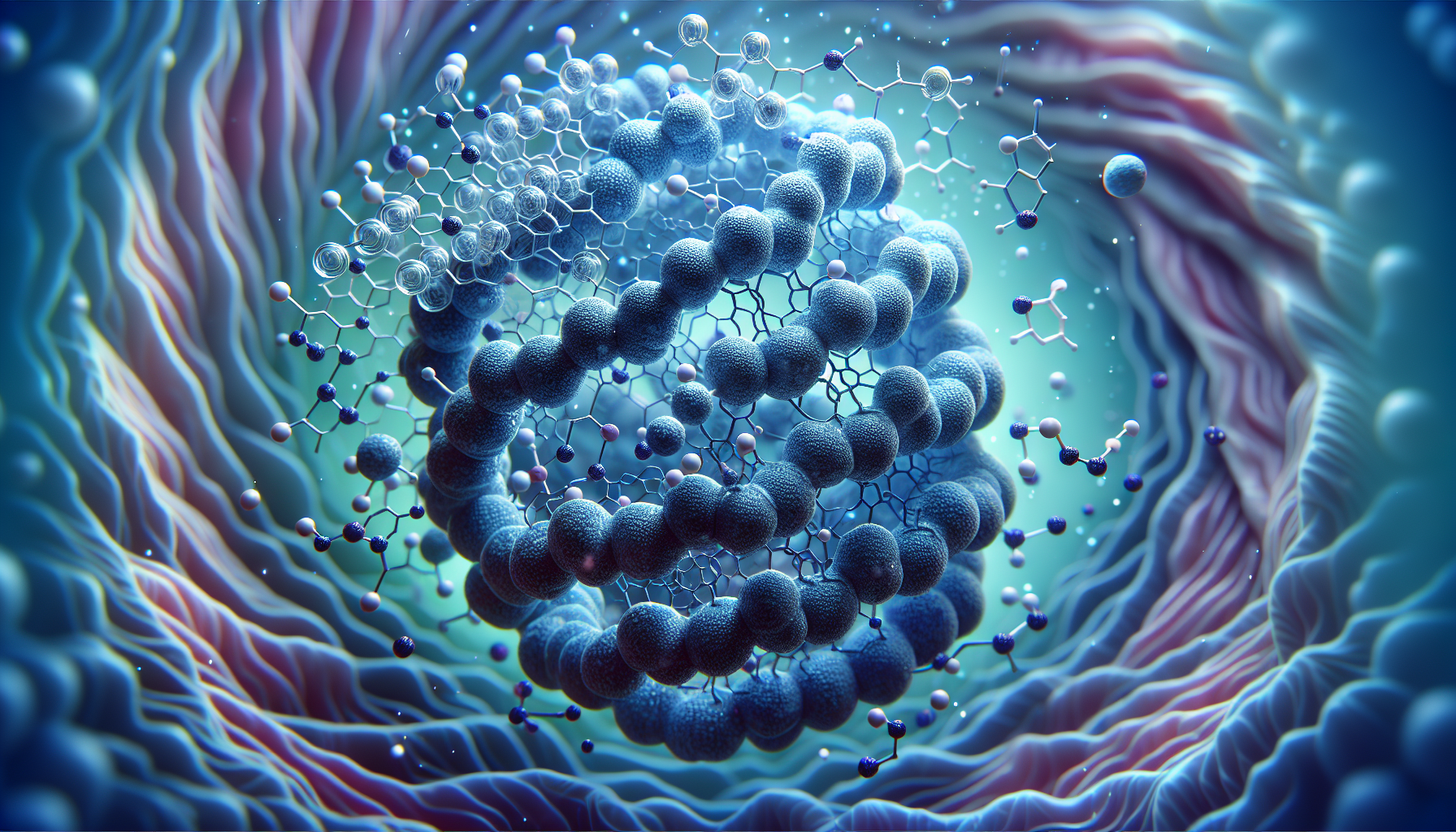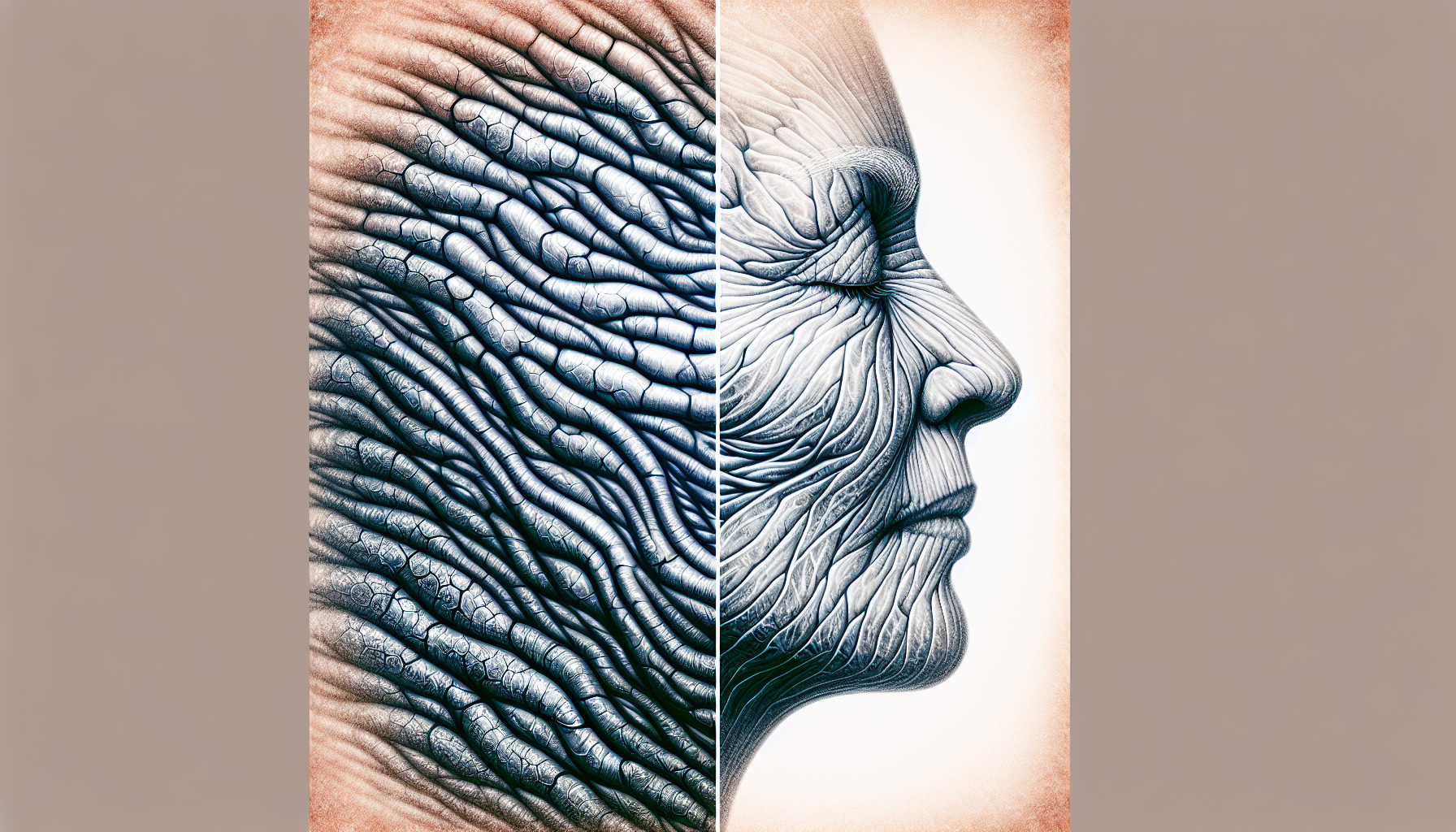Skin and Collagen Nutrition: Feed Your Skin for a Youthful Glow
Skin and collagen are essential partners in maintaining youthful, vibrant skin. As the most abundant protein in our bodies, collagen provides the foundation for skin’s elasticity and firmness.
Imagine restoring your skin’s youthful glow and smoothness, defying the visible signs of aging. Sound too good to be true?
While our natural collagen production declines with age, leading to wrinkles and sagging, there’s hope. Scientific advances have unlocked ways to boost collagen levels and rejuvenate skin.
Ready to turn back the clock on your skin? Discover how harnessing the power of collagen can transform your complexion and boost your confidence.
Key Takeaways
- Collagen is vital for skin elasticity and hydration, but production declines with age, causing visible aging signs.
- Collagen supplements, especially hydrolyzed collagen and peptides, can improve skin firmness, elasticity, and hydration.
- Clean-sourced organic collagen powder offers a comprehensive supplement option, providing multiple collagen types from diverse sources with potential benefits for skin, joints, and overall health.
- Natural collagen production can be enhanced through a balanced diet, UV protection, and skincare products containing vitamin C and peptides.
The Skin-Collagen Connection: Your Key to Timeless Beauty
Imagine a reality where joint pain is a thing of the past and your skin defies the forces of gravity and time. This isn’t a dream—it’s the wonder of collagen, a protein that’s more than just a buzzword in beauty circles.
It’s the adhesive that binds us together, making up an astonishing three-quarters of our skin and a third of our protein content.
Collagen is the most abundant protein in our bodies, serving as the primary building block for our muscles, bones, and, most importantly, our skin. It’s the architect of our body’s structure, strength, and support.
However, as we progress through life, our internal collagen production starts to decline.
The once-abundant protein, accounting for about 30% of our body’s total protein, starts to diminish. This decline is due to collagen degradation, a natural process that accelerates with age.
Though this decline is a natural part of aging, it doesn’t mean we should accept it without resistance.
With 28 identified types of collagen, each playing a unique role in our bodies, it’s the Type I collagen, comprising over 90% of the body’s collagen, that’s especially crucial for the skin’s structure.
Numerous human studies have explored the potential of collagen, aiming to comprehend its multiple benefits and strategies to retain our youthful vitality.
Understanding Collagen and Its Importance for Skin

Collagen serves as the skin’s foundation, forming a collagen matrix essential for maintaining skin elasticity, and the ability to bounce back.
When your skin is rich in collagen, it’s like a well-hydrated sponge—supple, resilient, and smooth.
But as collagen production dwindles, the signs of skin aging, such as wrinkles and reduced skin hydration, become more apparent.
This is where collagen supplements, and specifically collagen peptides, come into play as a beacon of hope.
Collagen supplements are not just a passing trend; they are backed by science to improve skin health.
Imagine a world where your skin not only retains its youthful firmness but also its dewy glow.
Oral collagen supplements can help us achieve just that, supporting our natural collagen levels and bolstering skin hydration.
The benefits of collagen are manifold, and they extend to improving skin texture and moisture levels, promoting overall skin health, and contributing to a robust collagen synthesis process.
But that’s not all.
Collagen doesn’t just work its magic on the surface; it penetrates deep into the skin cells, reinforcing the skin’s structure from within.
By adding collagen powder to your diet or taking collagen daily, you can help your body maintain its natural collagen levels, even as time tries to deplete them.
It’s not just about the grams of collagen you ingest; it’s about maintaining a harmony between the collagen you produce and the collagen you supplement.
How Collagen Affects Skin Health
Dive into the world of collagen and you’ll find it’s not just a single benefit we’re talking about—it’s a cascade of improvements that can transform the skin.
Collagen supplements are like a gym membership for your skin, working out the connective tissues and boosting skin cell turnover.
With the right kind of collagen peptides, you can wake up to skin that’s as resilient as it was in your youth, with a visible reduction in fine lines and wrinkles.
As we age, collagen degradation accelerates, leading to a decrease in collagen levels and skin elasticity.
As we age, the collagen in our skin begins to break down faster than we can replace it, leading to sagging skin that loses its youthful bounce.
But here’s where the story gets interesting: oral collagen supplements have been shown to have a favorable impact on skin elasticity and hydration, offering a beacon of hope for those looking to turn back the clock on their skin.
Skin Elasticity and Firmness

Skin elasticity is like the spring in a mattress, supported by a robust collagen matrix; it’s what allows your skin to snap back after being stretched.
But when collagen levels dip, so does the skin’s ability to bounce back, leading to sagging and loose skin.
Enter hydrolyzed collagen supplements. Think of them as personal trainers for your skin, coaching it back to its former firmness and flexibility.
The science speaks volumes.
A meta-analysis of 19 studies put hydrolyzed collagen to the test and found that it significantly improved skin elasticity. That’s right, not just a minor boost but a significant improvement.
With hydrolyzed collagen, you’re not just wishing for firmer skin; you’re actively working towards it.
Skin Hydration

When it comes to radiant skin, hydration is key.
Think of your skin cells as tiny sponges; when they’re full of moisture, they plump up, making your skin look smooth and radiant.
Collagen fibers play a starring role in this process, helping to lock in that precious skin moisture.
But it’s not just about drinking water; it’s about the structural integrity that collagen peptides provide to help keep the moisture where it belongs—in your skin.
Hydrolyzed collagen isn’t just a one-hit-wonder; it brings a multitude of benefits to the table, including improved skin hydration, as well as joint health. It’s like a moisturizer you can drink.
And if that’s not enough, consider aloe vera, which doesn’t just soothe sunburns but can also amplify your skin’s collagen levels, giving you that extra hydration boost.
Reduction of Fine Lines and Wrinkles

Now, let’s talk wrinkles—the bane of a smooth complexion.
As our natural collagen production wanes, the collagen matrix weakens, leading to the formation of creases and lines.
But hope is not lost.
Collagen supplements, particularly hydrolyzed collagen, can step in to fill that gap, literally.
By reinforcing the skin’s connective tissue, these supplements help to smooth out those fine lines and may even prevent new ones from forming.
With just 1–12 grams of hydrolyzed collagen per day, you could see a noticeable reduction in wrinkles and dryness.
It’s not an overnight miracle but a gradual improvement as the collagen peptides work their way into the skin’s structure, bolstering it against the ravages of time.
Types of Collagen Supplements
The world of collagen supplements is as varied as the benefits they offer, each type supporting collagen fibers in unique ways.
From hydrolyzed collagen to collagen peptides and even marine collagen, there’s a type for everyone, each with its own set of skin health perks.
Whether you’re looking to improve skin hydration, elasticity, or reduce the appearance of wrinkles, there’s a collagen supplement out there tailored to your needs.
Hydrolyzed collagen is the industry’s darling, known for its easy absorption and skin-loving benefits.
Then there are collagen peptides, the smaller, more targeted fragments that zero in on skin, bone, and cartilage health. And let’s not forget marine collagen, the ocean’s gift to skin hydration.
Each type of collagen in these supplements plays a different tune, but together they compose a symphony of skin health benefits.
Hydrolyzed Collagen
Let’s zoom in on hydrolyzed collagen, the form that’s been broken down into smaller peptides for easier absorption by the body.
It’s like pre-digesting the protein so your body can absorb and use it more efficiently.
Most collagen supplements available today are hydrolyzed, and it’s not hard to see why.
Hydrolyzed collagen supplements typically contain two or three powerful amino acids that are the building blocks of protein in your body.
Studies have demonstrated that taking hydrolyzed collagen can lead to improved skin hydration and elasticity, as well as reductions in wrinkles.
These benefits are clear and supported by research. It’s like giving your skin a drink from the fountain of youth.
And because it’s so easily absorbed, you can start seeing results in your collagen matrix without waiting ages.
Collagen Peptides
Collagen peptides are the tiny troopers of the collagen world, derived from larger collagen fibers and ready to be absorbed through your digestive system.
These small protein fragments are the secret agents that infiltrate your skin, bones, and cartilage, providing the reinforcements needed for optimal health.
And when it comes to skin hydration, they’re a force to be reckoned with.
But the benefits of collagen peptides go beyond just hydration. They’re like a multi-tool for your body, contributing to skin elasticity, joint health, and overall well-being.
By incorporating collagen peptides into your diet, you’re equipping your body with the tools it needs to maintain a youthful, radiant complexion.
Marine Collagen
Marine collagen comes from the depths of the ocean, offering a high bioavailability that’s hard to beat.
Derived from fish and other marine sources, it’s like the elite special forces of collagen supplements, renowned for its effectiveness in improving skin hydration and overall texture.
Marine collagen is a beacon of hope for those seeking alternatives to traditional animal collagen.
It’s not just another fish in the sea; it’s a powerhouse of skin hydration benefits that can make a real difference in your skin’s health and appearance.
With marine collagen, you’re not just supporting your skin’s structure; you’re elevating your collagen matrix to new heights of hydration and radiance.
Clean Sourced Organic Collagen Powder: A Comprehensive Supplement
As we explore ways to support our body’s collagen needs, clean-sourced organic collagen powder emerges as a noteworthy option.
This type of supplement aims to provide a broad spectrum of collagen types while adhering to high standards of purity and quality.
Key Features:
- Diverse collagen profile: Includes types I, II, III, V, and X
- Sourced from multiple animals: Beef, chicken, fish, and eggshell
- Enhanced absorption: Contains added vitamin C, B6, zinc, and silica
- Complete protein: Includes tryptophan for a full amino acid profile
- Low calorie: 32 calories per serving, with no carbs or sugar
- Quality assurance: Third-party tested for contaminants
Potential Benefits:
Users of such supplements often report improvements in skin appearance, joint comfort, and hair and nail strength.
Some studies suggest collagen supplementation may support cardiovascular health, metabolism, and digestive wellness.
However, individual results can vary, and it’s important to maintain realistic expectations.
Ease of Use:
The fine powder formulation is designed to mix easily into liquids without clumping, and its neutral taste allows for versatile use in various beverages or recipes.
While clean-sourced organic collagen powder can be a valuable addition to a healthy lifestyle, it’s not a magic solution. For optimal results, consider incorporating it as part of a balanced diet and consistent skincare routine.
If you’re interested in exploring how this type of collagen supplement might benefit your skin and overall health, consult with a healthcare professional to determine if it’s right for you. They can provide personalized advice based on your individual needs and health status.
How to Enhance Collagen Production Naturally
While collagen supplements can be a fantastic addition to your skincare arsenal, let’s not forget the power of natural collagen production.
Through a balanced diet, healthy lifestyle habits, and an intentional skincare routine, you can support your body’s collagen production and keep your skin looking its best.
By focusing on diet, lifestyle, and skincare, you can counteract collagen degradation and support healthy, resilient skin.
Naturally boosting collagen production can be likened to tending a garden. You need the right ingredients—nutrients, sunlight, and care—to help it flourish.
By focusing on diet, lifestyle, and skincare, you create an environment where collagen can thrive, supporting healthy, resilient skin.
Diet and Nutrition
A well-rounded diet forms the basis of natural collagen production, providing the nutrients needed to support collagen fibers.
By combining amino acids from protein-rich foods like bone broth with vitamins and minerals, your body has the raw materials it needs to produce collagen.
Incorporating collagen-rich foods, such as citrus fruits and other vitamin C-rich foods, are particularly crucial for collagen synthesis, acting as a catalyst for the process.
But it’s not just about vitamin C. Vitamin D, zinc, and copper are also key players in the collagen production orchestra, each contributing to the strength and integrity of the collagen structures in your skin.
By ensuring your diet includes these nutrients, you’re laying the groundwork for healthy collagen levels and, in turn, a youthful complexion.
Healthy Lifestyle Habits
Your lifestyle choices can either foster or impair your body’s collagen production, influencing the rate of collagen degradation.
Smoking, excessive UV exposure, and a diet high in sugar can wreak havoc on collagen, leading to premature aging and weakened skin.
But by adopting healthy habits like wearing sunscreen daily and maintaining a balanced diet, you can protect your collagen and keep your skin looking youthful.
In addition to dietary changes, incorporating regular exercise and managing stress are crucial for collagen health.
Exercise boosts circulation, which in turn promotes collagen production, while stress management ensures that your body isn’t constantly in a state of high alert, which can degrade collagen over time.
Skincare Routine
A targeted skincare routine can be a powerful ally in maintaining your collagen matrix.
Topical applications of vitamin C not only protect your skin from the sun but also aid in collagen maintenance.
Peptides, too, are valuable additions to your skincare arsenal, stimulating the body’s natural collagen production.
By incorporating ingredients like vitamin C and peptides into your daily skincare routine, you can help support the natural collagen synthesis process, ensuring your skin stays firm, hydrated, and resilient against the elements.
It’s like having a personal bodyguard for your skin, keeping it safe and supported day in and day out.
Scientific Evidence Supporting Collagen Supplementation
Beyond anecdotal evidence, there’s substantial scientific support for the claims about collagen supplements and their impact on collagen fibers.
Scientific research has put these supplements to the test, and the results are promising.
Studies suggest that regular intake can lead to improved skin hydration, increased elasticity, and a reduction in the appearance of wrinkles.
The numbers speak for themselves.
An analysis of 26 randomized controlled trials found that oral collagen supplements had a significant positive impact on skin health.
One study even showed a 28% increase in skin hydration after just 12 weeks of supplementation. And it’s not just about the immediate effects; the benefits of collagen supplements continue to be felt even after discontinuation, indicating a lasting improvement in skin quality.
Participants in these studies have reported improvements that go beyond just the numbers.
They’ve seen firsthand the transformative effects on skin dryness, elasticity, and appearance, providing a subjective affirmation of the benefits of collagen supplementation.
Potential Side Effects and Considerations
As with any supplement, considering the possible side effects and their potential impact on individual health is crucial.
Collagen supplements, while generally safe, can cause digestive issues such as bloating, heartburn, and a feeling of fullness for some people.
It’s important to note that during studies, no adverse skin reactions were reported, indicating a favorable safety profile for topical use.
For some individuals, collagen degradation may be accelerated by certain lifestyle factors, making supplementation less effective.
However, not everyone can jump on the collagen bandwagon. Those with allergies to common ingredients in these supplements, such as fish, shellfish, or eggs, should steer clear to avoid allergic reactions.
Additionally, individuals adhering to vegetarian, vegan, Kosher, or Halal diets need to be mindful of the source of the collagen in their supplements.
It’s also worth noting that some supplements may contain high doses of vitamins or other additives that could interact with medications or cause issues if consumed in excess.
It’s advisable to consult a healthcare professional before starting any new supplement regimen, especially with collagen supplements.
This is particularly important for pregnant or breastfeeding individuals, due to potential interactions with other ingredients that could affect both the mother and the child.
Always remember that moderation is key, and understanding your own body’s reactions and tolerances is crucial for a positive experience with collagen supplementation.
Summary
After diving deep into the world of collagen, it’s clear that collagen fibers are a cornerstone of skin health and vitality.
From its role in maintaining skin elasticity and hydration to its ability to reduce the appearance of fine lines and wrinkles, collagen holds the key to unlocking a more youthful complexion.
Supplements come in various forms, each with unique benefits, and scientific evidence strongly supports their efficacy in improving skin quality.
But it’s not just about what you can add to your diet; it’s also about the natural ways to boost collagen production.
A balanced diet, healthy lifestyle habits, and a dedicated skincare routine all play a crucial role in supporting the body’s own collagen synthesis.
And while there are potential side effects to consider, these are generally mild and can be managed with careful consideration and professional guidance.
In conclusion, collagen is more than just a trend; it’s a fundamental component of our skin’s structure and function.
Whether through supplementation or natural production, maintaining healthy collagen levels can lead to a more radiant, supple, and youthful complexion.
So, why not give your skin the support it deserves and embrace the power of collagen? Start here!
Frequently Asked Questions
Can collagen supplements really improve skin health?
Yes, studies have shown that collagen supplements can improve skin hydration, elasticity, and reduce the appearance of wrinkles. This suggests that they can indeed improve skin health.
Are there any natural ways to boost collagen production in the body?
Yes, maintaining a balanced diet rich in protein and vitamin C, along with regular exercise and sun protection, can naturally boost collagen production in your body.
How do I choose the right type of collagen supplement?
Consider your dietary restrictions, allergies, and specific skin goals when choosing a collagen supplement.
Hydrolyzed collagen offers general benefits, while marine collagen is best for high bioavailability and skin hydration.
Are there any side effects to taking collagen supplements?
Yes, some people may experience digestive issues when taking collagen supplements, so it’s important to consult a healthcare professional before starting them. It’s always best to seek professional advice.
How long does it take to see results from collagen supplements?
It can take about 12 weeks of consistent use to see significant improvements in skin hydration and elasticity from collagen supplements.



Comments